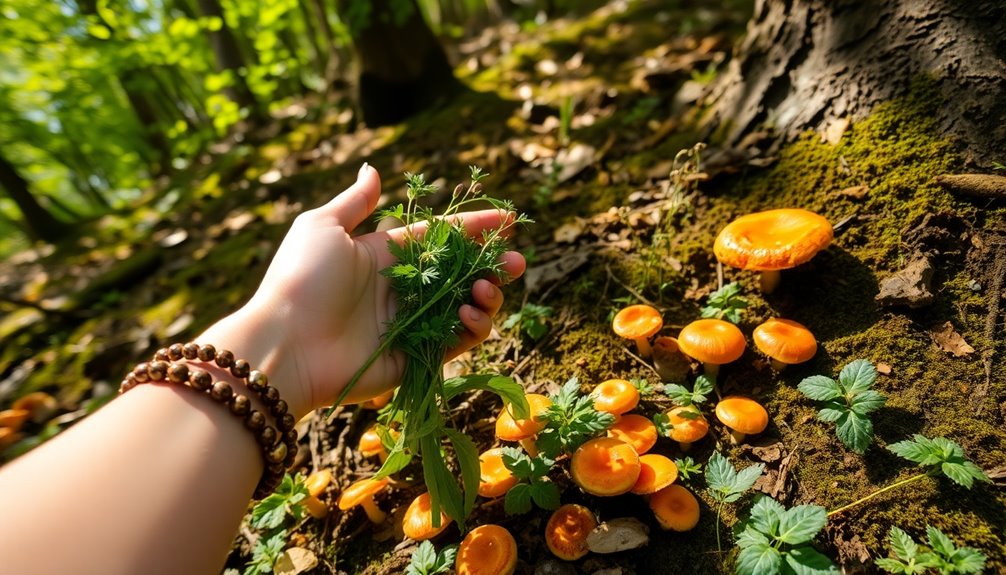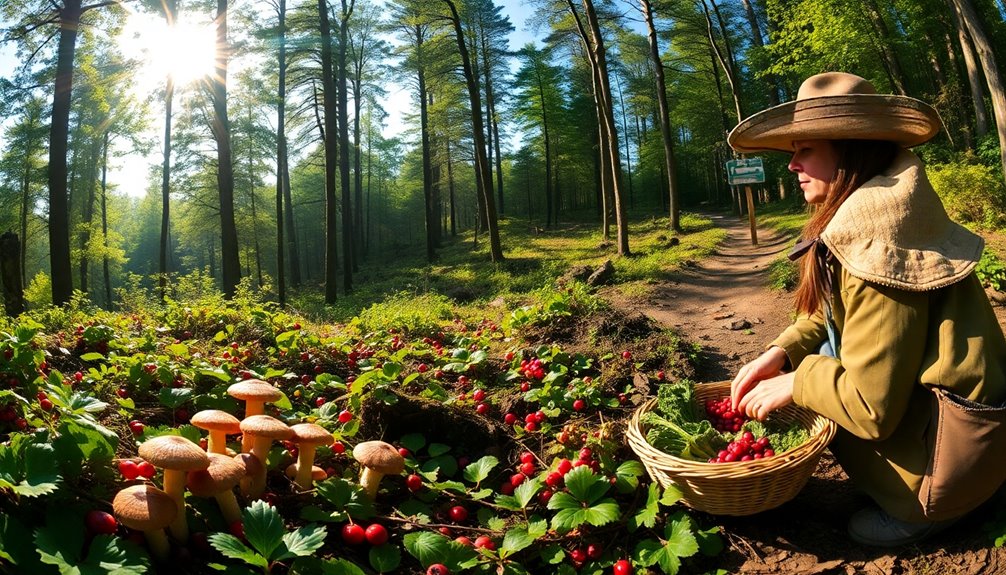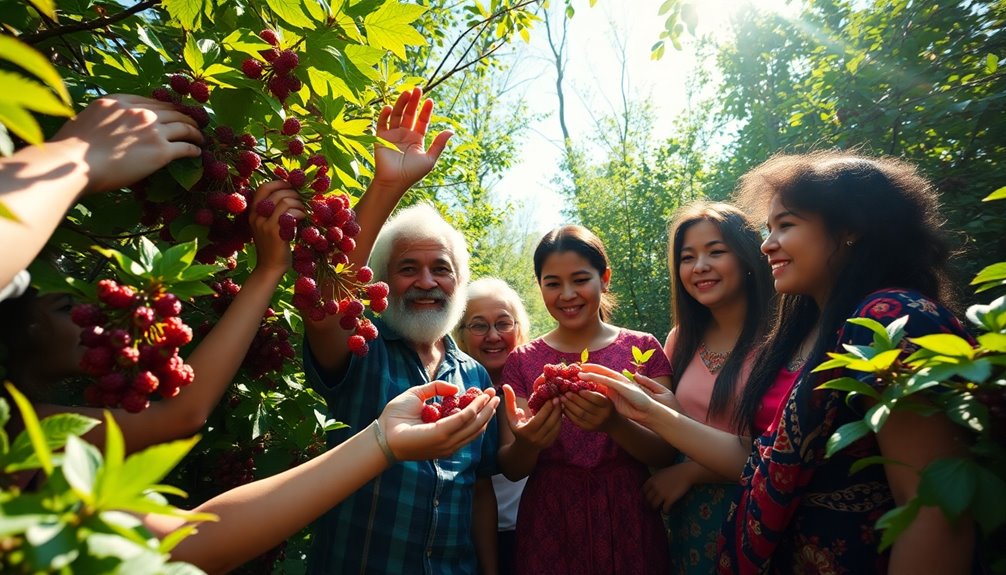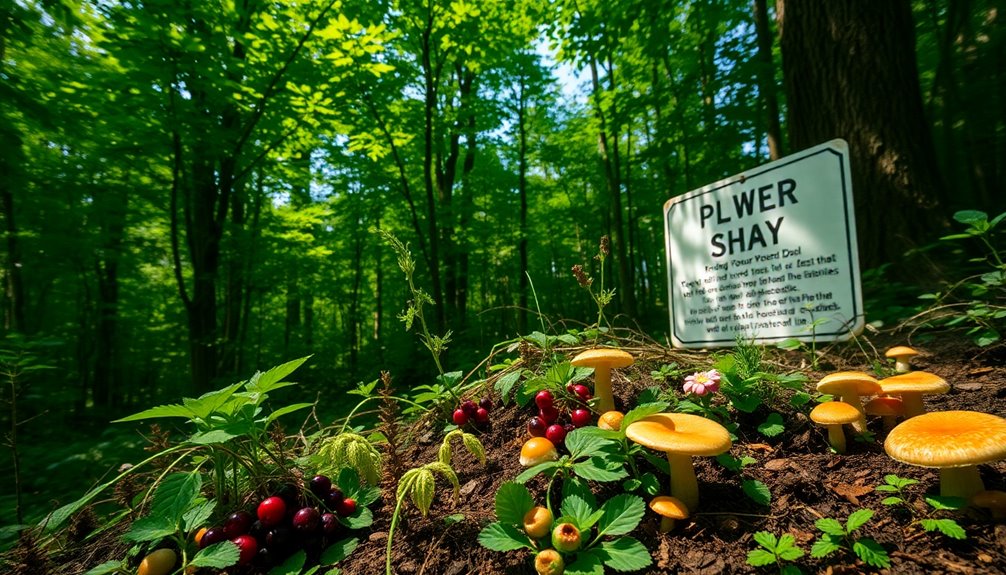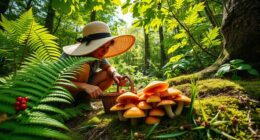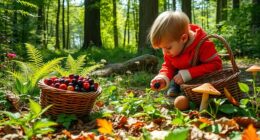The term "foraging" traces its roots back to the Old French word "forrage," which translates to fodder or pillaging. It emerged in the early 14th century, highlighting the practice of gathering resources for survival. This word is linked to the Frankish *fodr and the Proto-Germanic *fodram, both associated with food. Initially, it referred to plundering for food, evolving over time into a cultural practice tied to sustainable resource management. Foraging connects people with nature while promoting biodiversity and community ties. There's so much more to discover about its fascinating journey and cultural significance.
Key Takeaways
- The word "forage" comes from the Old French term "forrage," meaning fodder or pillaging, emerging in the early 14th century.
- It is derived from the Frankish word *fodr and Proto-Germanic *fodram, which relate to food and sustenance.
- The verb form of "forage" appeared in the early 15th century, originally signifying the act of plundering for food.
- Connections to Old English terms like "fodder" and "forager" highlight its agricultural roots and historical significance.
- Foraging evolved from survival strategies to cultural practices, reflecting human interactions with natural resources over centuries.
Etymology of Forage
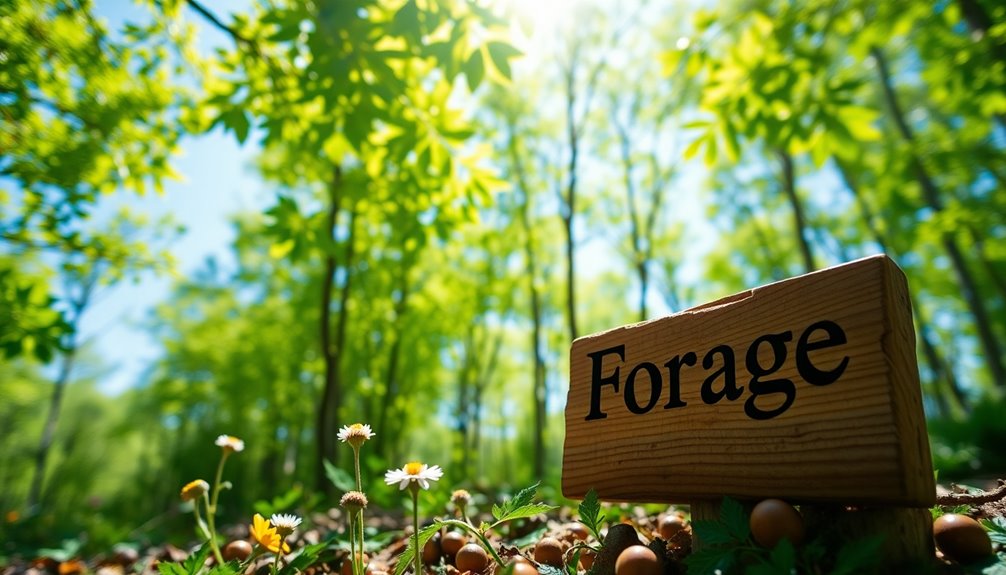
The word "forage" has an intriguing history that traces back to the Old French term "forrage," which referred to fodder and pillaging. This term emerged in the early 14th century, reflecting a deep connection to resource gathering.
You might find it interesting that "forage" comes from the Frankish word *fodr and the Proto-Germanic *fodram, both of which relate to food and feeding.
When you think of the verb "forage," remember it first appeared in the early 15th century, initially meaning to plunder or hunt for food. This evolution highlights the importance of gathering provisions, whether for livestock in agrarian societies or for military campaigns, as seen in texts from the 16th century onward.
The linguistic ties to Old English and words like "fodder," "forager," and "foray" illustrate how interconnected these terms are in the context of food sourcing.
Additionally, the practice of foraging aligns with the greatest happiness principle seen in utilitarianism, emphasizing the collective benefit derived from sustainable gathering practices.
The "Life of George" could easily reference these themes, showcasing how the need for sustenance shaped language.
Historical Context of Foraging
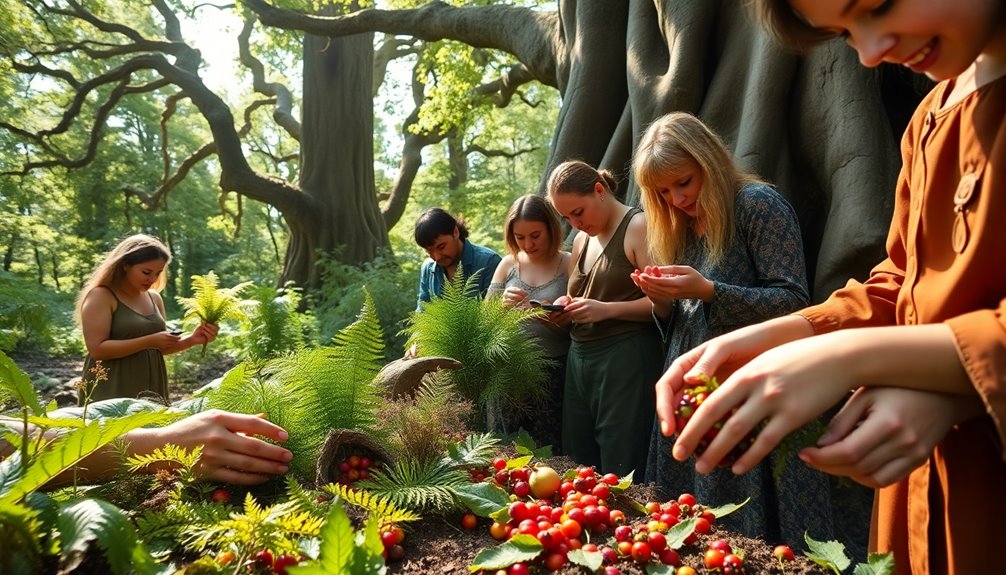
When you look at the historical context of foraging, you see its evolution from a survival strategy to a significant cultural practice.
Foraging has roots in military provisions and agricultural methods, reflecting its importance across different societies.
Etymology of Forage
For those curious about the origins of the word "forage," it reveals a rich history intertwined with agricultural and military practices. The term emerged in the early 14th century from the Old French word "forrage," which referred to fodder or provisions for livestock. This connection emphasizes its agricultural roots, as it initially focused on feeding animals.
By the early 15th century, the verb form of "forage" appeared, shifting to mean hunting or plundering for food. You can see how this evolution reflects a more aggressive approach to gathering resources, particularly in times of scarcity. The related term "fodder," derived from Old English, specifically denotes bulk food for livestock, reinforcing the agricultural aspect.
Interestingly, the term "forager" came into use by the late 14th century, describing someone who gathers food. There's also a close relationship with the word "foray," which signifies a raid or sudden attack, highlighting the historical practices of pillaging for resources.
Etymologically, "forage" connects to Frankish *fodr and Proto-Germanic *fodram, underscoring its significance in both agricultural and military contexts throughout history. Additionally, the term remains relevant today, as modern foraging practices contribute to sustainable farming practices that support local ecosystems.
Historical Foraging Practices
Throughout history, humans have relied on foraging as a fundamental survival strategy, drawing from a wealth of natural resources. From prehistoric times, early humans gathered wild plants, hunted animals, and scavenged for food to sustain themselves.
The term "forage" initially referred to food for livestock in the early 14th century, but its meaning expanded to encompass the act of searching for food in the wild.
Historical accounts, such as Virgil's "Æneis," demonstrate that foraging also had military implications, as people pillaged crops for survival. In agricultural contexts, foraging practices evolved to include managing pasture lands and cultivating essential forage crops, like alfalfa, which became significant in North American farming by 1845.
Foraging practices have been particularly important for indigenous and traditional communities, who've maintained deep cultural ties to their environments. Their sustainable methods of resource gathering reflect a profound understanding of biodiversity.
- Early humans depended on gathering, hunting, and scavenging.
- The military aspect of foraging has historical significance.
- Indigenous communities' practices have fostered sustainable resource management.
Cultural Significance Over Time
Across various cultures and eras, foraging has woven itself into the fabric of human existence, shaping not only diets but also societal values and practices. The term "forage," rooted in the Old French word "forrage," initially hinted at fodder and pillaging, illustrating its dual role in agriculture and military logistics. Foraging has played a crucial role in enhancing ecosystem health by promoting biodiversity and resource availability. In fact, the use of essential survival gear can greatly improve foraging success in the wild.
Historical texts, from Shakespeare's "Love's Labour's Lost" to Scott's "Ivanhoe," reveal how foraging became synonymous with sustenance and resourcefulness, reflecting the survival strategies of ancient societies. Foraging techniques often included certain essential survival skills that allowed communities to thrive in diverse environments. Additionally, the diverse ecosystems in regions like Minnesota foraging fun highlight the abundance of wild edibles that have been integral to human diets.
As you explore this topic, you'll find that foraging's military connotations emerged in the early 19th century, particularly with references to forage caps, underscoring its logistical importance in supporting armies.
Today, foraging practices are being reinterpreted, emphasizing sustainability and environmental consciousness. Essential survival skills link back to these age-old practices, advocating for a return to respectful interactions with nature.
Evolution of Foraging Practices
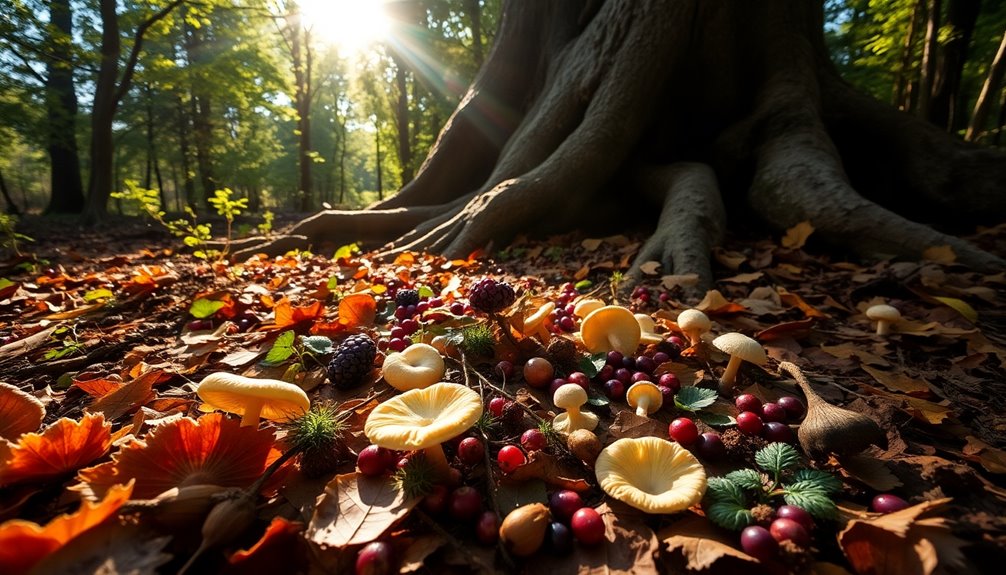
As humans evolved, so did our approaches to foraging, reflecting changes in environment, technology, and social structures. Initially, foraging encompassed a blend of hunting and gathering, where prehistoric societies relied heavily on natural resources for survival. The term "foraging" itself, derived from the Old French "forrage," originally referred to fodder for livestock but expanded to include searching for food.
Over time, historical practices showed duality, including agricultural gathering and military pillaging, underscoring foraging's role in sustenance and conflict. This evolution led to significant distinctions in modern foraging practices:
- Wild foraging emphasizes gathering food from natural environments.
- Agricultural foraging focuses on cultivating specific forage crops.
- Contemporary foraging promotes sustainable food sourcing, reconnecting people with traditional methods. Furthermore, just as wood-burning stoves can enhance self-sufficiency in heating needs, foraging encourages independence from commercial food sources, allowing individuals to connect with their local ecosystems.
Today, foraging's resurgence highlights its ecological significance, appealing to those who wish to embrace sustainable living.
Cultural Significance of Foraging
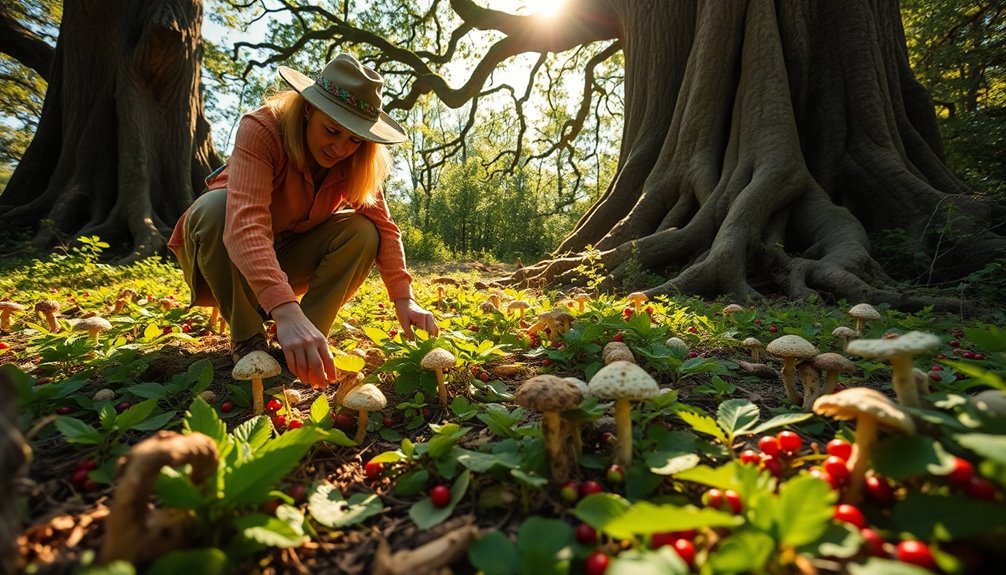
For many, foraging represents more than just a means of survival; it embodies a deep cultural connection to the land and its resources. Throughout history, foraging practices have shaped how communities live, influencing agricultural development and the dynamics of social interaction.
You might notice that literature often depicts foraging as a metaphor for human resilience and conquest over nature, showcasing the resourcefulness inherent in this practice.
The act of foraging fosters social networks, especially in hunter-gatherer societies where sharing resources is essential. This cooperation strengthens community bonds, emphasizing the importance of collective survival.
In recent years, foraging has gained traction within sustainable food movements, reflecting a growing cultural awareness of environmental issues and local food sourcing.
Educational programs teaching foraging skills play an important role in preserving cultural heritage. They promote knowledge about native plants and traditional gathering practices, ensuring that these critical connections to the land remain alive. Additionally, the use of foraging baskets has historical significance in various cultures, showcasing the practical aspects of resource gathering.
Modern Usage of Foraging
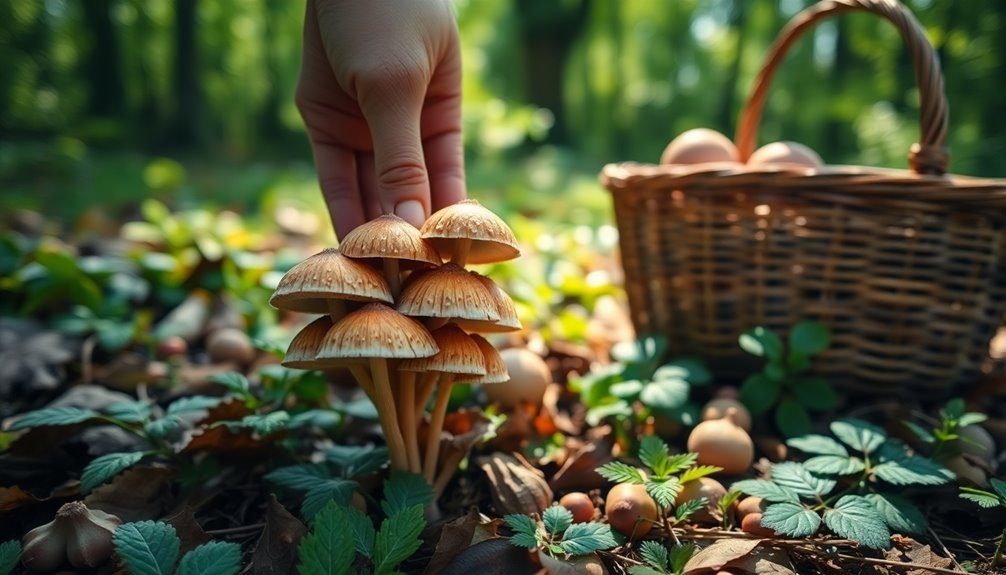
Modern foraging is becoming a go-to practice for many looking to embrace sustainable food options.
You might find yourself exploring your city for wild edibles, showing how adaptable foraging can be even in urban settings.
As you engage with local ecosystems, you'll discover new flavors while supporting biodiversity and sustainable living.
Urban Foraging Trends
Urban foraging is rapidly becoming a popular pastime, as city dwellers seek to connect with nature and source their food sustainably. People like you're discovering the bounty that urban environments can offer, from wild herbs to fruiting trees lining the streets. Regular outings to forage can also promote good behavior in pets as they learn to adapt to new environments alongside their owners. Additionally, foraging can be a way to enhance your understanding of local air quality considerations as you become more aware of the plants that thrive in your area. Furthermore, foragers can benefit from developing a budget to manage their time and resources effectively as they explore. Engaging in urban foraging can also foster a mindset of abundance and gratitude, allowing participants to appreciate the resources nature provides.
As you venture out, you not only gather food but also contribute to enhancing local biodiversity.
Many urban foragers participate in workshops and community events to sharpen their skills in identifying and harvesting wild edibles. This hands-on approach encourages a deeper understanding of the ecosystem around you.
Check out some of the benefits of urban foraging:
- Strengthens community ties by sharing knowledge and resources.
- Promotes sustainability by reducing reliance on commercial food sources.
- Encourages environmental awareness as you learn about native plants and their roles.
Additionally, urban foraging can help foster emotional alignment as individuals connect with their environment and cultivate mindfulness in their daily lives.
However, remember that legal considerations for foraging vary by location. Some cities allow foraging in public parks, while others restrict it on private property.
Embrace this trend as you explore your urban surroundings, and enjoy the thrill of discovering edible treasures in unexpected places!
Sustainable Food Practices
In recent years, foraging has emerged as a vital aspect of sustainable food practices, allowing you to tap into the abundance of wild edibles that grow in your local ecosystem. By gathering native plant species, you promote biodiversity and ecological health. Engaging in foraging can also enhance your mental resilience, as connecting with nature has been shown to positively impact emotional well-being. Additionally, the act of foraging supports emotional regulation by providing a calming experience that can reduce stress and anxiety. Moreover, incorporating omega-3 rich foods into your foraged meals can further enhance their nutritional value. Monsters in folklore often symbolize the fear of the unknown, much like the uncertainties encountered in foraging.
Urban foraging has gained traction as you seek to reconnect with nature and source local, organic food options right in your city, focusing on edible plants and mushrooms. Educational programs on foraging are becoming increasingly popular, teaching you how to identify and safely harvest wild food. This knowledge enhances food security and reduces your reliance on commercial agriculture.
However, it's important to be aware of legal considerations; foraging laws can vary greatly between public and private lands. Understanding these regulations guarantees you practice sustainable foraging responsibly. The modern foraging movement aligns perfectly with sustainability goals. By consuming locally sourced food, you help lower carbon footprints associated with industrial agriculture. Additionally, incorporating nutritional balance in your foraged meals can enhance their health benefits and support overall well-being.
Implications for Sustainability
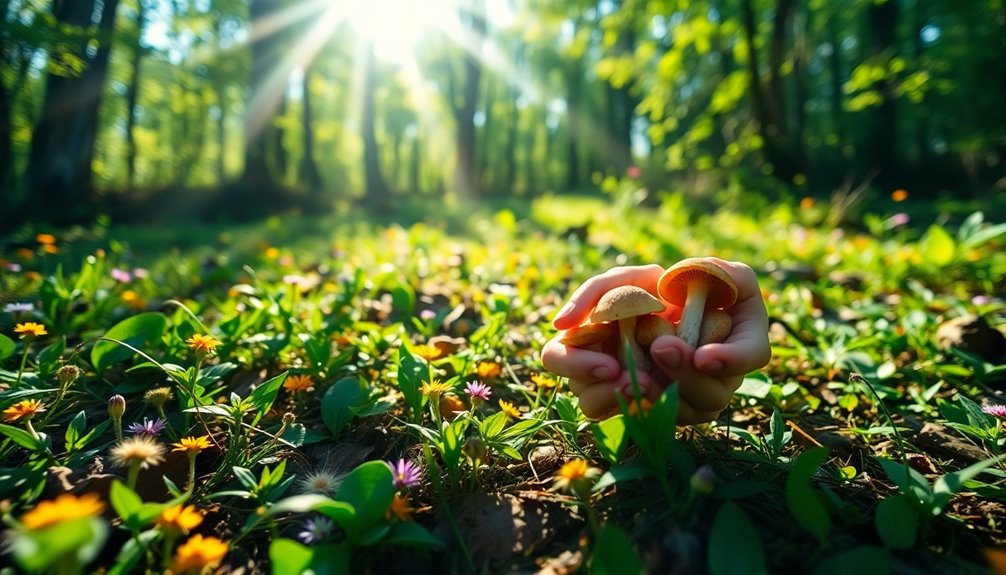
Foraging practices are more than just a way to gather food; they're an essential component of sustainable living. By promoting the use of native plants, foraging reduces our reliance on industrial agriculture, which can degrade ecosystems.
You'll find that urban foraging is gaining popularity, allowing you to utilize available edible resources in city environments and contributing to local food security.
Engaging in foraging has several implications for sustainability:
- Enhances biodiversity: By focusing on native flora, you support diverse ecosystems that are crucial for ecological health.
- Promotes education: Educational programs that teach foraging skills deepen your connection to the environment and highlight the importance of preserving local plant species.
- Encourages sustainable practices: Sustainable forage management helps maintain soil health and prevents land degradation, ensuring resources are available for future generations.
Reviving foraging as a modern practice not only supports ecological balance but also reduces the negative impacts of conventional farming methods.
Frequently Asked Questions
What Is the Origin of Forage?
The origin of the word "forage" dates back to the early 14th century. It originally referred to food for livestock, especially horses and cattle.
You'll find its roots in the Old French term "forrage," meaning fodder. By the early 15th century, "forage" evolved into a verb, describing the act of searching for food or provisions.
Over time, it expanded beyond agriculture, reflecting broader practices related to food sourcing and sustainability.
What Language Does the Word Forage Come From?
You might think the origins of the word "forage" are complicated, but it's actually quite fascinating.
The term comes from Old French, specifically "forrage," meaning fodder or pillaging. It traces back to early Germanic languages, reflecting a rich history of food gathering.
Understanding its roots helps you appreciate how the meaning evolved from livestock feed to searching for wild food, connecting agriculture and survival in a way that's relevant today.
What Is the Origin of the Word Forager?
The word "forager" traces back to the late 14th century, when it referred to someone who gathers food or provisions.
You'll find it closely linked to "forage," which originates from the Old French word "forrage," meaning fodder. This term highlights the historical practice of searching for food, reflecting a shift towards sustainable food gathering.
Today, you see "forager" used for those who actively seek out wild edibles in nature.
What Is the Meaning of Foraging?
Foraging means actively searching for and gathering food, often in natural settings.
When you forage, you're not just collecting wild edibles; you're also connecting with your environment and utilizing available resources.
This practice has deep roots in human history, where it was essential for survival.
Nowadays, foraging's relevance has grown, highlighting sustainability and food security as you explore local biodiversity and discover the richness of your surroundings.
Conclusion
In the garden of language, "foraging" blooms, rooted in history and nourished by culture. As you wander this landscape, you uncover the richness of our past and the promise of sustainability. Just like foragers gather wild treasures, you too can harvest knowledge and wisdom from the world around you. Embrace this journey, and let it inspire you to cultivate a deeper connection with nature, nurturing both your mind and the earth as you thrive together.

